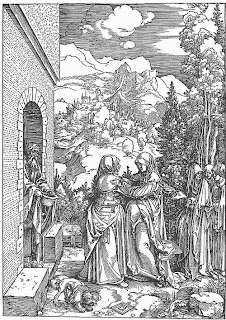 This day commemorates the joyous visit Mary paid to her cousin Elizabeth, following The Annunciation. Inspired by the amazing news that she was to become the mother of the Christ and in response to the joyous word that her old and previously barren cousin was also pregnant, she joined her older cousin during Elizabeth's sixth month of pregnancy (see Luke 1:39-56).
This day commemorates the joyous visit Mary paid to her cousin Elizabeth, following The Annunciation. Inspired by the amazing news that she was to become the mother of the Christ and in response to the joyous word that her old and previously barren cousin was also pregnant, she joined her older cousin during Elizabeth's sixth month of pregnancy (see Luke 1:39-56).After Mary declared the wondrously good news, Elizabeth responded to the Blessed Virgin, "Blessed are you among women, and blessed is the fruit of your womb! ... Behold, when the sound of your greeting came to my ears, the baby in my womb leaped for joy. (vv. 42, 44)" She concluded by giving full credit and glory to God while also commending her young cousin's hearty faith: "Blessed is she who believed that there would be a fulfillment of what was spoken to her from the Lord. (v. 45)"
Mary responded with the Magnificat, the beautiful song of praise beginning, "My soul magnifies the Lord. (vv. 46-55)" It's not clear whether Mary stayed there until after the birth of John or if she left immediately beforehand; Luke merely said that the Virgin "remained with her about three months and returned to her home. (v. 56)"
And so, as we encounter God sending the Forerunner and the Messiah into the world, we see a study in contrasts. Two women stand before each other. One seemingly too old to bear children now carries the final prophet of the Old Covenant. The other, youthful and as yet unwed — completely unprepared in the eyes of the world — carries the One who brings both the Advent and the Fulfillment of the New Testament. And again we see, in the fullness of time, one age passing away while another age begins — an age that has no end but which lasts unto eternity.
The reaction of Jesus' unborn cousin and the words of his mother also serve as reminders to many Christians about the sanctity of life. Christian pro-lifers point to John's celebration as clear evidence of the humanity and the consciousness of children who are still in utero.
Note: This illustration by Albrecht Dürer is from the Web Gallery of Art.
Lection
Psalm 138
Isaiah 11:1-5
Romans 12:9-16
Luke 1:39-56
Collect
Almighty God, You chose the virgin Mary to be the mother of Your Son and made known through her Your regard for the poor and lowly and despised. Grant that we may receive Your Word in humility and faith, and so be made one with Jesus Christ, Your Son, our Lord, who lives and reigns with You and the Holy Spirit, one God, now and forever.
The Magnificat
My soul magnifies the Lord,
and my spirit rejoices in God my Savior,
for he has looked on the humble estate of his servant.
For behold, from now on all generations will call me blessed;
for he who is mighty has done great things for me,
and holy is his name.
And his mercy is for those who fear him
from generation to generation.
He has shown strength with his arm;
he has scattered the proud in the thoughts of their hearts;
he has brought down the mighty from their thrones
and exalted those of humble estate;
he has filled the hungry with good things,
and the rich he has sent empty away.
He has helped his servant Israel,
in remembrance of his mercy,
as he spoke to our fathers,
to Abraham and to his offspring forever.
Technorati Tags: The Visitation | Blessed Virgin Mary | Virgin Mary | Saint Mary | St. Mary | Mary | Theotokos | Mother of God | BVM | Elizabeth | Saint Elizabeth | St. Elizabeth | Magnificat | Luke 1:46-55 | Luke 1:39-56 | Jesus | Christ | Jesus Christ | Church Year | liturgics | liturgical calendar | Christian feasts | lectionary | Church history | Christianity | Christian | Lutheranism | Confessional Lutheran | Dürer | Web Gallery of Art | pro life | life | Aardvark Alley
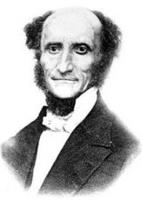 C. F. W. Walther was a founding father of The Lutheran Church — Missouri Synod. He served as its first president from 1847 to 1850 and again from 1864 to 1878. Others who worked with him in the Synod's early days included Friedrich Wyneken and Wilhelm Sihler.
C. F. W. Walther was a founding father of The Lutheran Church — Missouri Synod. He served as its first president from 1847 to 1850 and again from 1864 to 1878. Others who worked with him in the Synod's early days included Friedrich Wyneken and Wilhelm Sihler.The son of a pastor, he was born in Langenchursdorf, Saxony on 25 October 1811. Walther's studies at the University of Leipzig and the influences of older Lutherans helped convince him that Lutheran teachings were correct expositions of Holy Scripture. However, some of his mentors were staunch Pietists, relying heavily on experience and emotion as part of conversion and sanctification. Walther rejected Pietism but seemed to always struggle against its encroachment in his theology.
Fearing a "union church" with the Reformed — as had been happening in Prussia — Walther joined with several other younger pastors under the leadership of Martin Stephan, who encouraged emigration to the United States in order to maintain confessional purity by avoiding imposed unionism. In 1839 he left Germany with other Lutherans. After a series of trials, the party settled along the Mississippi River south of Saint Louis, Missouri. Circumstances still clouded in a certain degree of ambiguity led the Saxons to depose Stephan as their leader and they finally settled upon Walther as his replacement.
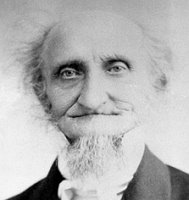 He served as pastor of several congregations in St. Louis, founded Concordia Seminary, and in 1847 was instrumental in the formation of the LCMS (then called the Deutsche Evangelisch-Lutherische Synode von Missouri, Ohio und anderen Staaten — the German Evangelical Lutheran Synod of Missouri, Ohio, and Other States). Walther worked tirelessly to promote confessional Lutheran teaching and doctrinal agreement among all Lutherans in the United States.
He served as pastor of several congregations in St. Louis, founded Concordia Seminary, and in 1847 was instrumental in the formation of the LCMS (then called the Deutsche Evangelisch-Lutherische Synode von Missouri, Ohio und anderen Staaten — the German Evangelical Lutheran Synod of Missouri, Ohio, and Other States). Walther worked tirelessly to promote confessional Lutheran teaching and doctrinal agreement among all Lutherans in the United States.Walther was a prolific writer and speaker. Among his most influential works are Church and Office (aka Church and Ministry) and The Proper Distinction between Law and Gospel. He also published Der Lutheraner, the LCMS's official news magazine for most of the time the Synod spoke and understood German.
Walther was one of many who stood steadfast in confession of the Evangelical, Orthodox, Catholic, and Apostolic Faith. For a sampling of some of the others in Lutheranism, please see The Meanies of Grace. For his unflagging devotion to the grace of God in Christ Jesus, the LCMS honors him with the titles of "Doctor and Confessor of the Church."
Lection
Psalm 46
Isaiah 55:6-11
Romans 10:5-17
John 15:1-11
Collect
O Lord God, heavenly Father, we pray that, as You raised up C. F. W. Walther to lead the Lutherans in American into a renewed appreciation of their confessional heritage and trust in the saving Gospel of Jesus Christ, so You would continue to provide them with faithful pastors and leaders, keep them steadfast in Your grace and truth, defend them against all enemies of Your Word, and bestow on Christ's Church Militant Your saving peace; through Jesus Christ, Your Son, our Lord, who lives and reigns with You and the Holy Spirit, one God, now and forever.
Technorati Tags: C.F.W. Walther | Carl Ferdinand Wilhelm Walther | Friedrich Wyneken | Wilhelm Sihler | Church Year | liturgical calendar | Christian | Lutheran | Lutheranism | confessional Lutheran | confessional Lutheranism | orthodox Lutheran | orthodox Lutheranism | commemorations | lectionary | historical theology | church history | Lutheran history | American Lutheran history | American history | biography | The Lutheran Church — Missouri Synod | LCMS | Concordia Seminary | Concordia Seminary, Saint Louis, Missouri | Law and Gospel | The Proper Distinction between Law and Gospel | Church and Office | Church and Ministry | Der Lutheraner | Aardvark Alley
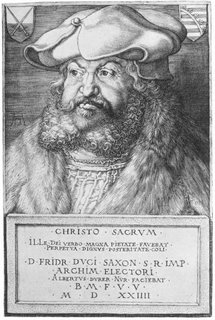 Frederick the Wise, elector of Saxony from 1486 to 1525, was Martin Luther's sovereign in the early years of the Reformation. Indeed, were it not for Frederick, there might not have been a Lutheran Reformation. Born in Torgau in 1463, he became so well known for his skill in political diplomacy and his sense of justice and fairness that he was called "the Wise" by his subjects.
Frederick the Wise, elector of Saxony from 1486 to 1525, was Martin Luther's sovereign in the early years of the Reformation. Indeed, were it not for Frederick, there might not have been a Lutheran Reformation. Born in Torgau in 1463, he became so well known for his skill in political diplomacy and his sense of justice and fairness that he was called "the Wise" by his subjects.Though he probably never met Luther face-to-face, Frederick repeatedly protected and provided for him. In all likelihood he saved the reformer from a martyr's fate. Even in earlier days, Frederick unknowingly contributed to the Reformation, for in 1512, Vicar-General Johann von Staupitz of the Augustinian Order came to the Elector, asking him to subsidize the expenses of the promising but poor scholar-monk as a means of strengthening Frederick's prized university in Wittenberg.
While he never made public renunciation of Roman Catholicism, Frederick refused the pope's demand to extradite Luther to Rome for a heresy trial in 1518. When Emperor Charles V declared Luther an outlaw in 1521 at the Diet of Worms, Frederick provided sanctuary for Luther at the Wartburg castle.
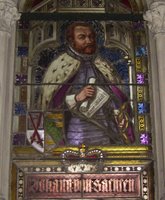 Finally, at the end of his life, the elector gave the clearest indication of his beliefs and sympathies. On his deathbed, Frederick received the Lord's Supper in both kinds — a clear confession of the Evangelical faith.
Finally, at the end of his life, the elector gave the clearest indication of his beliefs and sympathies. On his deathbed, Frederick received the Lord's Supper in both kinds — a clear confession of the Evangelical faith.Frederick received great encouragement in his support of Luther and the Evangelical Reformation from his brother John, who wholeheartedly embraced the Reformation in its early years. Upon Frederick's death, Duke John became Elector of Saxony. John's nickname was "the Steadfast" — indicating how he continued his brother's protection and encouragement of the Reformation.
Frederick's life illustrates many of the rapid changes sweeping across Europe during the Renaissance and Reformation. He went from being a collector and venerator of relics — and a believer in meritorious human works — to one who trusted in God's salvation given by grace through faith in Christ.
Technorati Tags: Martin Luther | Frederick III of Saxony | Frederick III | Frederick the Wise | Elector Frederick | Lutheran | Lutheranism | Roman Catholicism | Catholicism | Christianity | Reformation | Lutheran Reformation | Wittenberg | Electoral Saxony | Saxony | Church history | German history | European history | historical theology | hagiography | biography | Church Year | liturgical calendar | commemorations | lectionary | Aardvark Alley
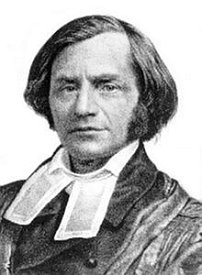 Friedrich Conrad Dietrich Wyneken stands along-side C.F.W. Walther and Wilhelm Sihler as one of the founding fathers of The Lutheran Church — Missouri Synod. He was born to Pastor Heinrich Christoph and Anne Catharine Louise Wyneken in on 13 May 1810 and baptized 22 May in St. Andreas Church, Verden, Kingdom of Hannover, Germany.
Friedrich Conrad Dietrich Wyneken stands along-side C.F.W. Walther and Wilhelm Sihler as one of the founding fathers of The Lutheran Church — Missouri Synod. He was born to Pastor Heinrich Christoph and Anne Catharine Louise Wyneken in on 13 May 1810 and baptized 22 May in St. Andreas Church, Verden, Kingdom of Hannover, Germany.Wyneken came to Baltimore in 1838 and shortly thereafter accepted a call to be the pastor of congregations in Friedheim and Fort Wayne, Indiana. Supported by the mission society of Wilhelm Loehe's, he served as an itinerant missionary in Indiana, Ohio, and Michigan, particularly among Native Americans.
Together with Loehe and Sihler, Wyneken founded Concordia Theological Seminary in 1846 in Fort Wayne, Ind. He later served as the second president of the LCMS during a period of significant growth (1850-64). His leadership strongly influenced the confessional character of the LCMS and its commitment to an authentic Lutheran witness.
Technorati Tags: Friedrich Conrad Dietrich Wyneken | Friedrich Wyneken | F. C. D. Wyneken | Wilhelm Loehe | Wilhelm Löhe | Wilhelm Sihler | C.F.W. Walther | Church Year | liturgical calendar | Christian | Lutheran | commemorations | lectionary | missions | Indian missions | Native American missions | historical theology | church history | Lutheran history | American Lutheran history | American history | biography | The Lutheran Church — Missouri Synod | LCMS | Concordia Theological Seminary | Concordia Theological Seminary, Fort Wayne, Indiana | Aardvark Alley

